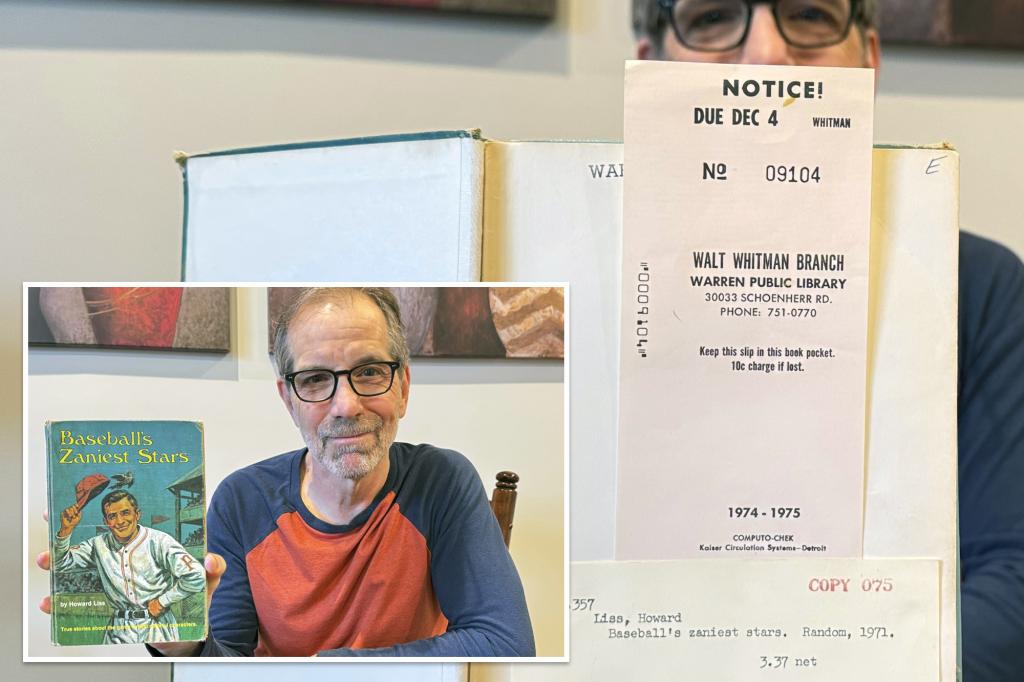Chuck Hildebrandt, a 63-year-old Chicago resident, recently attempted to return a book he borrowed from his hometown library in Warren, Michigan, a staggering 50 years ago. The book, “Baseball’s Zaniest Stars,” was checked out in 1974 when Hildebrandt was a 13-year-old schoolboy. His attempt to rectify his long-overdue loan, however, was met with an unexpected response: the library informed him that the book, and his record of borrowing it, had long been erased from their system. He was essentially told to keep the book. This unusual situation provides a fascinating glimpse into the evolution of library systems, the limitations of record-keeping, and the eventual goodwill that emerged from this half-century-old overdue book.
Hildebrandt’s return to his childhood home over the Thanksgiving holiday prompted his decision to finally return the book. He recounted how, amidst the chaos of moving and packing books over the years, the library book had inadvertently been packed away and forgotten. It wasn’t until several years ago, while browsing his bookshelves, that he noticed the tell-tale Dewey Decimal system number on the spine, triggering the realization of his decades-old oversight. The impending 50th anniversary of checking out the book seemed like the perfect opportunity to make amends. However, the library’s response highlighted the practical limitations of maintaining records for such extended periods.
Oksana Urban, the director of the Warren, Michigan library, explained that due to the passage of time and the evolution of their system, Hildebrandt and the book had effectively vanished from their records. There was no outstanding fine to pay, no reprimand to issue, and ultimately, no place for the book back on their shelves. The book, once a part of the library’s collection, had become a historical artifact, a tangible link to a library system of the past. The library’s response, while perhaps surprising, underscores the practical realities of managing and maintaining an ever-changing collection and the limitations of long-term record-keeping. The incident also raises questions about the balance between accountability for borrowed materials and the practical limitations of tracking them across decades.
While the library effectively absolved Hildebrandt of his overdue book, he decided to turn the situation into an opportunity for good. He initiated a fundraising campaign for Reading is Fundamental, a non-profit organization dedicated to promoting literacy. His target amount, $4,564, represents his estimation of what the accumulated late fees would have been over the 50 years, had the library been able to calculate them. This act of transforming a potentially embarrassing situation into a charitable endeavor demonstrates a commendable sense of social responsibility. It also highlights the unexpected positive outcomes that can emerge from seemingly negative circumstances.
Hildebrandt’s initial contribution of $457 kickstarted the campaign, aiming to leverage the publicity surrounding his overdue book to benefit a worthy cause. This resourceful approach showcases how an unusual personal experience can be transformed into a platform for promoting literacy and supporting educational initiatives. By choosing to donate to Reading is Fundamental, Hildebrandt demonstrates his commitment to fostering a love of reading and ensuring access to books for children, thereby turning a personal oversight into a public good.
This incident, spanning five decades, offers various perspectives: the challenges libraries face in managing records over extended periods, the unintentional oversight of a borrowed book, and the eventual transformation of a potentially embarrassing situation into a positive contribution to literacy. Hildebrandt’s story serves as a quirky reminder of the evolving nature of library systems, the passage of time, and the enduring power of books to connect us to the past, while also inspiring us to support literacy initiatives in the present. It’s a tale that began with an overdue book and evolved into a story of unexpected generosity and community support.

